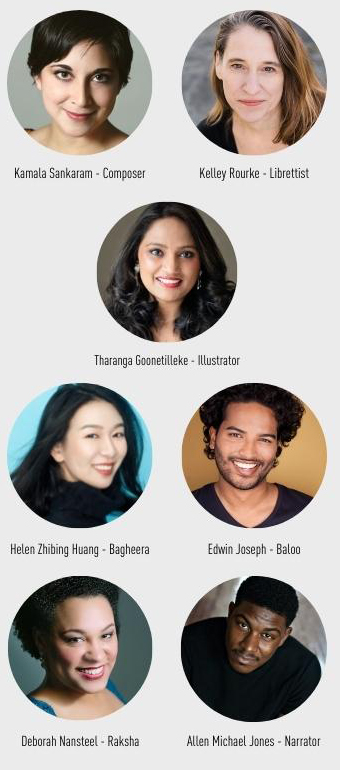The Jungle Book…Book
Join us for this fun-filled digital companion to Kamala Sankaram and Kelley Rourke’s world premiere youth opera, The Jungle Book, which offers a fresh take on characters and situations from Kipling’s collection of stories.
This preview of the opera that premieres on our stage this summer features a narrated children’s book paired with musical excerpts. The Glimmerglass Festival worked with the Central Valley Academy Chamber Choir and Chamber Singers under the direction of Mark Bunce.
Purchase tickets to the live event
From composer, Kamala Sankaram:
I’m very excited to share this music and story with you, but before you enter the jungle, I’d like to tell you a little bit about the kind of music you’ll be hearing, because it may be new for you. The music in this opera is based on Indian classical music. India has a long and rich musical tradition, reaching all the way back to before opera was even invented!
Indian classical music (called Hindustani music in Northern India and Carnatic music in Southern India) uses a system of notes called ragas. The word “raga” can be translated as “colors,” and that’s really what Indian classical music is all about — using the notes of the raga to create a specific color or mood. The raga system is very detailed — to really know a raga, you have to know which notes are most important, how the notes can be played in relationship to each other, how to ornament the note in order to show its beauty, and so on.
This opera uses common Hindustani ragas as a starting point and pairs them with operatic singing and harmonies. You may sometimes hear the choir singing the words “Sa Ri Ga Ma Pa Dha Ni Sa.” These are the names of the notes in the raga. Do you know the song that begins “Doe, a deer?” “Sa Ri Ga” is just like “Do Re Mi!”
The music also takes inspiration from the Indian approach to rhythm, which is called tala. Indian rhythms are clicliccl and us instruments like the tabla and the ghatam, both of which you can hear in the recording. The tabla are actually two drums, one pitched high, and one very deep. The ghatam is a clay pot that you play like a drum. You may also hear everyone clapping the rhythms, something found in Indian and Pakistani folk music. I hope you feel inspired to clap along!
Video: Lucas Godlewski
Audio Mix and Recording Engineer: Joel Morain
Central Valley Chamber choir
| Soprano: Alex Duga Claire Engel Caroline Nicolette Abby Overacker Abigail Paddock Emma Wheet |
Alto: Madeline Feldman Sierra Howard Ava Judd Gabriella Lawrence Ryan Parks Kathryn Rodgers Courtney White |
| Tenor: Ryan Clanton Anthony Joyce Cristopher Joyce Jason Keeler Dylan Powers Dylan Shafer |
Bass: Dominick Geloso Noah Johnston Ethan Parkhurst Tyler Rotondi Michael Shafer William Slentz |
Director: Mark Bunce
central valley Chamber Singers
| Soprano: Carsen Boucher Isabelle Evans Avery Hayes Hailey Looman Mackenazie Murphy Lorelei Stanley Isabella White |
Alto: Edith Cloutier Audreanna Greene Annamarie Lyman Kadence Lyman Chloe Salsman Autumn Tayler Tiffany Ward |
Director: Mark Bunce
The Glimmerglass Festival believes in the power of story as a cultural force and a means to create concrete change. We believe stories are strongest when they reflect diverse identities and life experiences. We envision a world of opera and the arts in which all people see themselves and their stories reflected, and all are able to reach their full potential. We strive to be leaders in the realization of that vision. We aim to create a world onstage, backstage and in the audience that celebrates and supports all people, so that we may move closer to realizing that world in our daily lives.
The Jungle Book (Kamala Sankaram/Kelley Rourke) is the fourth youth opera to be commissioned by The Glimmerglass Festival under the direction of Artistic & General Director Francesca Zambello.
The Jungle Book is generously sponsored by Betsy and Ed Cohen, with other major support from Ann Ziff, Arthur F. and Alice E. Adams Charitable Foundation, Howard & Sarah D. Solomon Foundation, Van Broughton Ramsey and Robert Nelson, The Aaron Copland Fund for Music, Inc., and The Amphion Foundation.


